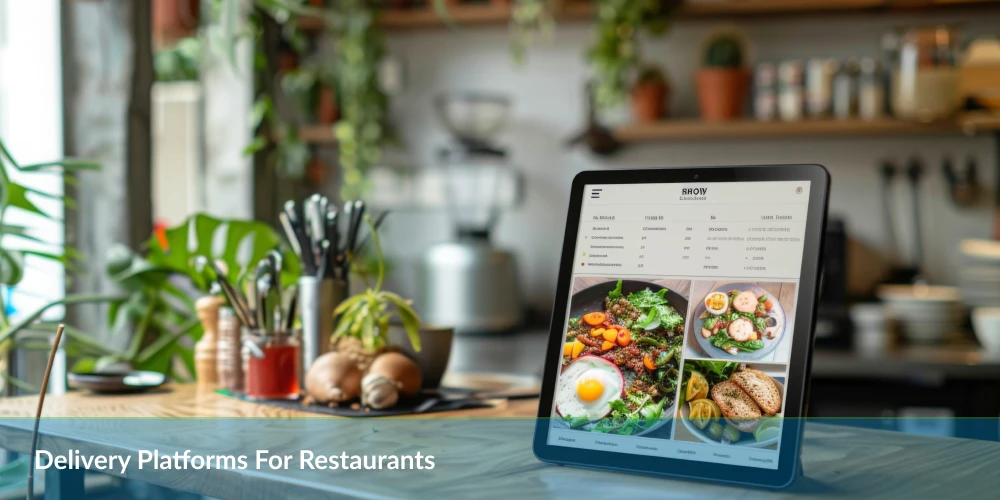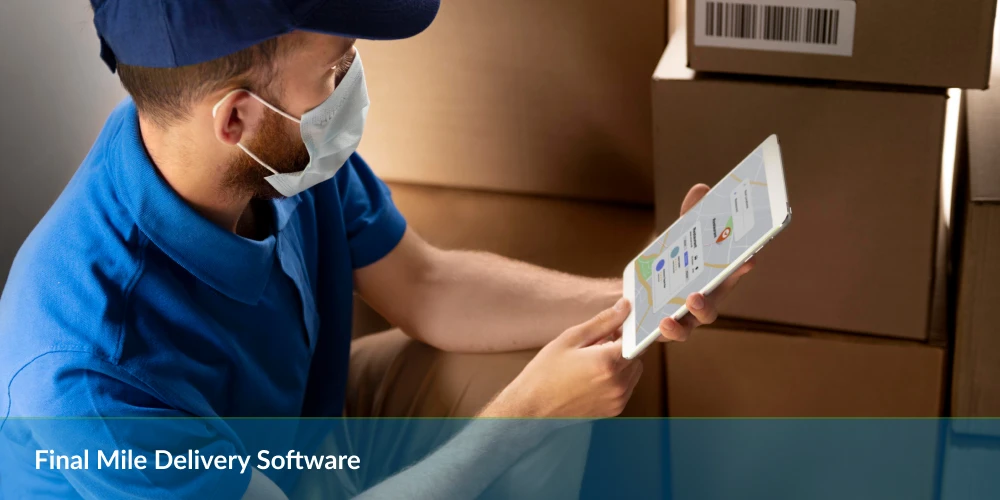Table of Contents
How do courier companies meet ever-growing delivery demands while maintaining efficiency and precision? Can technology truly bridge the gap between rising consumer expectations and operational challenges?
The answer lies in courier software management, a game-changing solution that is the backbone of modern delivery operations. This advanced software transforms how businesses operate in the fast-paced logistics sector, from tracking consignments in real time to optimizing routes and enhancing customer interactions.
With courier software management, companies unlock benefits like accurate tracking, reduced costs, and improved customer satisfaction. By embracing these tools, courier services can keep up with the competition and set new benchmarks for reliability and agility in an ever-evolving market.
Let’s understand it better!
Streamlining Delivery with Route Optimization
Route optimization is a transformative tool for courier services, enabling companies to exceed customer expectations with timely deliveries. By leveraging sophisticated algorithms, route optimization software calculates the quickest and most cost-effective paths for couriers. The immediate benefits include drastically reducing delivery times and fuel consumption, lowering operational expenses, and enhancing service quality.
The Importance of Route Optimization for Courier Services
Competitive courier operations demand efficiency, particularly in navigating complex delivery routes. Courier software management addresses this need through advanced route optimization, assessing numerous variables such as traffic patterns, road conditions, and delivery windows. The result is a streamlined delivery process that ensures couriers take the shortest, fastest routes to their destinations.
How Software Helps in Reducing Delivery Times and Fuel Consumption
Implementation of route optimization software plays a pivotal role in transforming traditional delivery models. By automating the planning process, the software minimizes the reliance on manual route planning, which can be subject to human error and inefficient. Couriers utilizing optimized routes experience less time on the road, which signifies prompt deliveries and lower fuel costs. This efficient use of resources is a financial benefit and aligns with sustainability goals by reducing carbon emissions.
Transform Your Courier Service with Real-Time Package Tracking
Customers now expect the ability to track packages with precision and ease. This demand for transparency has escalated alongside technological advancements, shaping how courier companies approach their service offerings.
When tracking information is provided, businesses and customers reap numerous benefits. Customers enjoy peace of mind and can monitor their parcels’ journey in real-time, enhancing the overall experience. For businesses, sharing tracking information reduces customer service inquiries, fostering trust and reliability while ensuring a competitive edge in the market.
Integrating tracking systems with customer notifications creates a dynamic communication network. This integration notifies customers at various stages of the delivery process, from when the package is dispatched to the final delivery confirmation. Such proactive engagement helps build customer loyalty and satisfaction, leading to repeat clientele and positive reviews.
Benefits to Businesses
Businesses benefit significantly from enhanced customer trust and brand loyalty, built through timely and transparent deliveries. Operational costs decrease as fewer customer service calls are required for efficient processes and proactive updates. Additionally, improved logistics efficiency is achieved through self-serve tracking options that empower customers while streamlining delivery operations, reducing the need for manual intervention.
When courier software management systems cleverly integrate real-time tracking, they address customer expectations and bolster the operation’s efficiency. This streamlined communication through tracking systems optimizes the customer experience with the service provider, ensuring a lasting and mutually beneficial relationship.
The Versatility of Delivery Scheduling
Delivery schedules vary greatly; customers expect flexibility and precision in receiving their parcels. Courier software management plays a pivotal role in addressing these expectations. By harnessing sophisticated algorithms and machine learning, courier platforms dynamically adapt to changing delivery windows, ensuring packages arrive within agreed-upon timeframes.
Software solutions allow couriers to cater to customer preferences with remarkable accuracy. Whether patrons prefer deliveries during specific hours or on certain days, courier software yields this flexibility. The functionality streamlines scheduling and reduces manual input, minimizing errors and increasing efficiency.
Managing same-day deliveries and advanced scheduling often involves complex logistical variables. Software systems assess the capability of the delivery fleet, estimate transit times, and factor in external influences such as traffic conditions or weather disruptions. This capability assures the accommodation of urgent shipments while permitting customers to plan for future delivery dates.
Integrating delivery scheduling into courier software does more than assign delivery slots. It enhances the entire delivery ecosystem, providing couriers with a tool that revolutionizes how packages are transported, tracked, and received. Diverse preferences and complex schedules are transformed into a cohesive, manageable process, guaranteeing satisfaction across the supply chain.
Fleet Management Fundamentals
The bedrock of courier businesses is effectively overseeing a fleet of vehicles. Courier software management is critical in this process, enabling continuous assessment and enhancements to ensure the fleet operates at peak capacity. By adopting this approach, businesses witness significant propulsion in operational efficiencies, with an accompanying decline in expenditures.
Overview of Fleet Management in Courier Businesses
At the heart of courier operations lies the competent administration of vehicle fleets. This encompasses a variety of tasks, including vehicle maintenance, driver management, route planning, fuel consumption tracking, and compliance with transportation regulations. A synergistic flow in these elements is paramount for successful deliveries.
Strategies for Maintaining and Optimizing Fleet Performance
- Meticulous maintenance schedules preempt downtime and extend the longevity of vehicles.
- Understanding and analyzing fleet data paves the way for informed decisions that lead to performance optimization.
- Driver training programs amplify safety and enhance fuel efficiency through better driving practices.
- The implementation of telematics offers a conduit to monitor vehicles, leading to swift identification and rectification of issues.
The Impact of Software on Fleet Operation Efficiency and Cost Reduction
Digital solutions have revolutionized fleet management, with software enabling precise control over fleet movements and logistics. Real-time tracking tools capture deviations and delays and address them promptly, diminishing potential revenue losses. Automated route planning software eliminates inefficiencies, reduces fuel costs, and improves time management. These tools construct an infrastructure drastically reducing operational costs while augmenting service quality.
Pro Tip: Leverage advanced courier software to automate delivery scheduling and use telematics for real-time fleet monitoring, reducing manual errors, enhancing efficiency, and cutting operational costs.
Efficiency with Barcode Scanning and Proof of Delivery
The Implementation and Advantages of Barcode Scanning
Barcode scanning transforms the parcel delivery process by offering real-time tracking of shipments. Couriers scan packages at each transition point, instantly updating the central management software. This automation reduces human error, accelerates the sorting process, and enhances parcel security by creating a digital trail. Besides, the data collected supports inventory control, providing insights into stock levels and operational flow.
Delivery companies that integrate barcode scanning benefit from higher accuracy in package handling. Shippers and recipients can track the movement of parcels, fostering transparency. Furthermore, the collected data lays the groundwork for predictive analytics, aiding companies in forecasting future package volumes and thus optimizing resource allocation.
Ensuring Secure Delivery with Digital Proof of Delivery
A digital proof of delivery is a reliable confirmation that recipients have received their parcels. This system typically requires recipients to sign on a mobile device, which then directly uploads this confirmation into the courier software. As such, disputes related to delivery are minimized, and customer satisfaction improves due to the clear, verifiable handoff of goods.
Adopting this technology bears the advantage of immediate paperless receipt storage, reducing the loss of documents and the need for physical archiving. The environmental footprint shrinks as paper usage declines. Moreover, couriers can address customer concerns or claims with indisputable delivery evidence, leveraging digital proof to maintain service integrity.
Boosting Communication with Customer Notifications
Effective communication forms the backbone of customer satisfaction in the courier industry. To elevate the service experience, courier software management integrates automated customer notification systems. These sophisticated platforms dispatch timely updates to customers at every stage of the delivery process, keeping them informed and engaged.
The Significance of Proactive Customer Communication
Automated dispatch of tracking information ensures that customers remain in control of their delivery expectations. Seamless communication reduces support calls since customers receive the information they need before they feel compelled to request it.
Automating Notifications and Updates for Enhanced Client Satisfaction
Navigating the complexities of modern delivery services requires agility—and automated notifications provide just that. This system triggers real-time alerts for package dispatch, transit status, and arrival times. By automating this communication, courier companies foster a sense of reliability and transparency with their clientele, leading to increased trust and customer retention.
- An algorithm calculates the estimated arrival time and communicates this to the recipient, minimizing uncertainty.
- Emails and SMS messages notify customers of any delays or changes in their delivery, thus reducing frustration and confusion.
- Customers can easily reschedule deliveries through automated options, offering flexibility and convenience.
E-commerce Integration Strategies
As the digital marketplace flourishes, courier software management has become indispensable for seamlessly integrating with e-commerce platforms. Businesses and consumers expect a symbiotic relationship between the online shopping experience and the logistics that ensure their products are delivered efficiently.
Software integration techniques must accommodate a range of e-commerce platforms, shopping carts, and marketplaces. An adept integration, facilitated by courier software management, links systems to exchange data such as order information, tracking numbers, and stock levels without human intervention. This exchange guarantees up-to-the-minute accuracy and reduces manual errors.
Courier software that effectively integrates with e-commerce workflows can trigger the automatic dispatch of delivery requests upon order placement. Furthermore, coordination between inventory management systems and courier software management enables businesses to maintain consistent stock levels and deliver on customer expectations.
Crafting these integrations involves:
- API connections that bridge disparate systems.
- Real-time data sharing.
- Adaptable architecture that can grow with both the e-commerce platform and courier service demands.
Also, considering payment gateways and ensuring secure data transmission lies at the heart of successful e-commerce integration strategies.
Such strategies elevate operational efficiency and customer satisfaction, as buyers receive timely updates and see their orders progress from cart to doorstep. The trajectory ahead for courier services will embrace more nuanced and robust e-commerce integration, with courier software management propelling both the industry and consumer convenience forward.
Utilizing Reports and Analytics for Smarter Decisions
The integration of data analytics transforms decision-making in courier service management. This shift allows companies to pinpoint areas for efficiency gains, customer satisfaction improvements, and revenue increases. With each report and piece of analytical data, courier services can dissect performance metrics and behaviors that lead to more informed strategic choices.
Harnessing the Power of Data in Courier Service Management
Data serves as the backbone for progression in today’s courier industry. Managers tap into a wealth of information from operational metrics, such as delivery times and distances, to financial figures like cost per delivery. This information illustrates performance and unveils trends that dictate future industry directions. Consequently, services align more closely with market needs, ensuring long-term viability.
A deep dive into report analytics guides couriers to fine-tune services while fortifying their competitive edge. This information-driven environment enhances the internal workings of a courier service. It elevates the customer experience, positioning the service as a leader in a data-centric market.
Empowering Couriers with Mobile App Features
Mobile technology transforms the landscape of delivery service, providing couriers with tools that fortify their day-to-day operations on the road. Drivers equipped with mobile app functionalities can navigate the most intricate aspects of delivery with greater ease and efficacy.
Key Mobile App Features That Assist Drivers on the Road
- Real-time GPS navigation allows for dynamic routing adjustments to traffic conditions, road closures, and other unexpected delays, ensuring timely deliveries.
- Push notifications update couriers about urgent changes to their delivery schedule or new pickup requests, maintaining a seamless workflow.
- Digital signature and image capture for proof of delivery streamline the confirmation process, reducing errors and enhancing customer trust.
- On-the-go access to delivery manifests and customer information ensures drivers are informed and ready to handle deliveries professionally.
- In-app messaging provides a secure and direct communication channel with dispatch and support teams, which is essential for resolving issues promptly.
How Mobile Technology Contributes to the Accuracy and Speed of Delivery
Mobile apps afford couriers a level of operational velocity and precision formerly unattainable. Instant access to package information and delivery details eliminates delays caused by misinformation. Moreover, integrated barcode scanning accelerates package handling, reducing the time between pickups and drop-offs. The upshot is a marked increase in customer satisfaction due to faster, more reliable service.
Automated processes, such as digital receipts and delivery confirmations, are imprinted directly into the courier workflow through mobile apps. This digitization decreases paperwork and eradicates common manual errors. Consequently, couriers can close out deliveries more quickly and with greater accuracy, ushering in an era of enhanced productivity and service quality within the logistics arena.
Cutting Costs with Smart Software Solutions
Effective courier operations management hinges on identifying and reducing excess costs. Integrating smart software solutions is a transformative approach to achieving sustainable financial health. Such tools scrutinize the mechanics of courier services, revealing cost-cutting opportunities without impacting service quality.
Pinpointing Expenditure Reduction Zones
Courier software exposes operational inefficiencies by analyzing data patterns. The software pinpoints exact areas where expenses can be pared down. Whether by optimizing delivery routes to save fuel or automating customer communication to reduce labor hours, the path to economization becomes clear.
Harnessing Software for Long-Term Savings
The deployment of courier software transcends short-term gains. Businesses gain a strategic ally in financial planning, using predictive analytics to foresee and mitigate future expenses. Moreover, this proactive stance fosters continual improvement of the courier process, compounding savings over time.
- Courier software minimizes route overlaps, lowering wear and fuel consumption.
- Automatic dispatching reduces the need for extensive back-office staff.
- Real-time tracking technology decreases lost packages and associated replacement costs.
Digital transformation through courier software management streamlines operations and establishes a foundation for enduring financial viability. The nexus between operational efficiency and cost-effectiveness becomes apparent, fueling a competitive edge in the dynamic courier marketplace.
Contactless Delivery Options in a New Era
Courier services have swiftly adapted to new consumer preferences for contactless delivery. This paradigm shift has been propelled forward due to health and safety concerns. Delivery software now has features enabling customers to receive packages without direct interaction with the delivery personnel.
No-contact services facilitated by technology assure a safe exchange while maintaining the integrity of the delivery process. Delivery personnel can leave packages in predetermined safe locations. Subsequently, customers get real-time updates and photographic evidence of delivery, negating the need for direct contact or signature confirmation.
- Real-time alerts notify customers of imminent delivery, allowing them to prepare.
- Geo-fencing technology provides precise location tracking, enhancing security for left packages.
- Photographic proof of delivery ensures accountability and customer satisfaction.
Operators can customize delivery protocols using courier software, dictating precise contactless delivery guidelines. These adjustments reflect a commitment to safety and customer preference adherence, positioning courier businesses at the forefront of modern delivery practices.
Prioritizing Environmental Impact and Sustainability
As courier businesses play a prominent role in environmental conservation, a diligent approach to sustainability becomes non-negotiable. Now more than ever, businesses are acknowledging the footprint of their delivery operations and seeking software solutions that advocate eco-friendly practices.
Software Solutions Enhancing Eco-Friendly Delivery Practices
Advanced algorithms within courier management software facilitate the reduction of carbon emissions. By optimizing delivery routes, these platforms ensure the shortest and most fuel-efficient pathways are employed. Beyond optimization, the software often incorporates vehicles’ fuel consumption data to recommend fleet adjustments, favoring fuel efficiency over longer service longevity.
- Automated scheduling aligns with ecological responsibility by maximizing load capacity, which equates to fewer trips and reduced emissions.
- Paper waste diminishes as digital proof of delivery and receipts replace physical documentation.
- With predictive analytics, companies proactively maintain their fleets, averting excessive fuel consumption due to suboptimal vehicle performance.
- Integrated recycling protocols for packaging materials can be monitored and enhanced.
Incorporating these innovative approaches, courier businesses steer towards greener operations and embrace cost-effectiveness. Subsequently, customers who value eco-friendly initiatives are more likely to be loyal to brands demonstrating environmental consciousness. Consequently, courier software management transcends operational efficiency and directly contributes to a company’s green ethos and market standing.
Pro Tip: Use courier management software to optimize routes, reduce fuel consumption, and implement eco-friendly practices. This will help your business reduce its carbon footprint and appeal to environmentally conscious customers.
Navigating International Shipping Regulations Compliance
Operators in the courier sector face a labyrinth of international laws and regulations. Countries around the globe set their own rules concerning taxation, customs duties, and prohibited items, making compliance a significant challenge. Combine this with varying documentation requirements, and you will have a scenario ripe for logistical complications.
Courier software management offers various compliance-focused features, mitigating legal risks in cross-border shipping. High-level software platforms may include automatic updates on changing international laws, ensuring that couriers are always equipped with the latest information. Tariff code libraries and customs documentation support can be integral to these systems, facilitating the accurate classification of items and expedited clearance through customs. Consequently, courier businesses can maintain a fluid operation that adheres to all legal stipulations of the nations they service.
Integration of shipping guidelines directly into the transactional workflow is a preventative measure against accidental non-compliance. With these features underpinning courier software management, companies reliably circumvent sanctions or customs holds, drastically reducing the potential for costly shipping delays or legal penalties.
Some courier software solutions extend their capability to include risk management modules. These modules can assist in identifying high-risk routes and offer recommendations or alerts to avoid potential compliance breaches. As a result, couriers can alter shipping plans proactively to stay within the confines of legal frameworks across international borders.
Moreover, the capability to handle electronic data interchange (EDI) is frequently an asset in top-tier courier management systems. EDI enables the seamless legal and regulatory documentation transfer between supply chain actors. This compatibility ensures couriers are issuing the correct information to customs officials, partner businesses, and customers, fostering transparency and adherence to regulatory demands.
Ultimately, courier software management is a valuable ally for companies eager to navigate the intricate maze of international shipping regulations. It equips them to streamline compliance procedures, safeguarding them from legal entanglements and positioning them favorably in the global marketplace.
Fortifying Courier Services with Security and Data Protection
Data security is a non-negotiable cornerstone within the courier industry. Companies dealing with critical information and sensitive material must deploy robust protection strategies. Measures range from advanced encryption algorithms to stringent access controls to safeguard customer data and company information. With the right software, these methodologies protect and reinforce trust and integrity in the courier ecosystem.
- Encryption: This technology transforms readable data into a coded format that only authorized parties can decipher, significantly mitigating the risk of data breaches.
- Access Controls: Limiting access to sensitive data to authorized personnel prevents unauthorized usage and potential leaks from within the organization.
- Two-Factor Authentication: Additional user identity verification steps provide a security layer that prevents malicious access even if login credentials are compromised.
- Regular Software Updates: Patches and software updates address vulnerabilities promptly, closing windows of opportunity for cyber-attacks.
- Compliance with Regulations: Following data protection regulations like GDPR ensures that courier services keep data safe and legally compliant.
Meticulous data safeguarding measures are not mere options; they are the foundation upon which the stability of courier services rests. The adoption of cutting-edge courier software management tools goes beyond functionality, penetrating deep into the realm of secured logistics. As the digital environment becomes more complex, couriers are equipped with advanced features that help them navigate the treacherous waters of cyber threats while maintaining the confidentiality and integrity of customer information.
Key Takeaways
- Route Optimization: The courier management software optimizes delivery routes, saving time and fuel, cutting costs, and enhancing delivery speed.
- Real-Time Tracking & Notifications: Customers receive live updates on their order status, and businesses can track deliveries in real-time, enhancing transparency and customer satisfaction.
- Flexible Scheduling: The system supports same-day and scheduled deliveries, allowing businesses to handle urgent requests or plan for improved efficiency.
- Fleet & Inventory Management: The software helps businesses monitor vehicle performance, manage resources, and ensure accurate inventory with features like barcode scanning and proof of delivery.
- E-commerce Integration & Data Analytics: Seamless integration with e-commerce platforms and powerful data analytics allow businesses to streamline operations, optimize routes, and improve decision-making.
Wrapping It Up!
Technological advancements continuously reshape the logistics landscape, and courier software management emerges as the backbone of efficient, secure, and customer-centric delivery services. Businesses see a transformation in operations by weaving in tools for route optimization, real-time package tracking, and effective communication channels. Seamless e-commerce integrations, mobile app capabilities, and contactless delivery options further illustrate this software’s adaptability and essential role in modern courier services.
Recognizing the complexity of international shipping regulations and the increasing demand for environmental sustainability emphasizes the need for robust software management systems. Data protection and security measures in these solutions safeguard sensitive information, instilling trust in customers and service providers.
As competition in courier services intensifies, staying ahead requires a commitment to innovation. Investing in comprehensive courier software management systems is not just a strategic move but a fundamental step for businesses intent on thriving in a rapidly evolving market. Integrating smart technology paves the way toward reducing operational costs, elevating service standards, and ensuring customer delight.
Business owners and logistics managers must consider the long-term benefits of these investments. The right courier software solution propels a courier business into the future, ready to tackle emerging challenges and capitalize on new opportunities. Reflect on the software’s capabilities, how it aligns with your business objectives, and the potential to revolutionize your delivery services. Prioritize these systems’ selection, implementation, and continuous evolution as the industry proceeds toward an increasingly digital tomorrow.
Ready to Revolutionize Your Delivery Operations? Unlock the power of NetworkON’s Courier Software Management to streamline your logistics, optimize routes, and elevate customer satisfaction. Stay ahead in a rapidly evolving market with real-time tracking, contactless delivery, and seamless integrations.
Join the future of delivery services today—Contact us to learn more and get started!
Frequently Asked Questions
How can delivery software help small businesses reduce costs?
Delivery software optimizes delivery routes, helping businesses reduce fuel costs and delivery times. Automating tasks like dispatching and scheduling eliminates inefficiencies, reduces the need for additional staff, and minimizes operational errors. This results in significant cost savings, especially for small businesses with limited resources. Furthermore, the software can help track key metrics and identify areas for cost reduction, helping businesses operate more efficiently.
Is delivery software easy to integrate with existing systems?
Yes, most modern delivery software is designed for easy integration. It can seamlessly connect with existing CRM systems, payment gateways, and inventory management tools. This ensures that small businesses can manage all their processes in one place without complex configurations or additional software. The ability to integrate with your current systems allows you to maintain a streamlined workflow and enhances data accuracy across all platforms.
How does real-time tracking benefit my business?
Real-time tracking offers several key advantages for small businesses. It allows you to monitor deliveries in progress, ensuring they are on schedule and identifying any potential delays. This capability enables you to provide accurate delivery time estimates to customers, improving their satisfaction and trust. In case of any issues, such as delays or route changes, businesses can respond promptly and communicate effectively with customers, improving customer service and retention.
Can delivery software improve the customer experience?
Absolutely! By using delivery software, small businesses can significantly enhance the customer experience. Route optimization ensures timely and accurate deliveries, and it also ensures products reach customers on time. Real-time tracking and proactive communication (such as delivery status updates or estimated delivery times) allow businesses to keep customers informed and engaged. This level of transparency and efficiency can help build stronger customer relationships, increasing their satisfaction and loyalty, ultimately leading to higher retention and repeat business.





0 Conversations